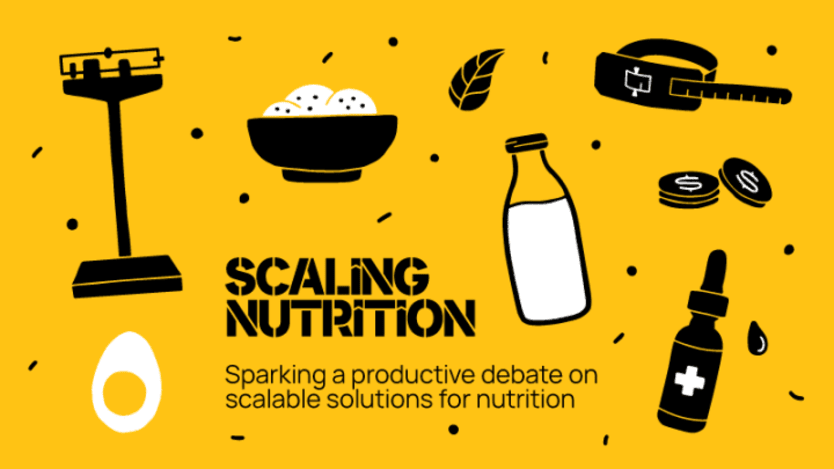
I recently came across a line on the website for an alliance of organizations advocating for better global water and sanitation: “WASH will be critical to the wider success or failure of the 2030 Agenda for Sustainable Development; nearly every one of the other goals rely in some way on WASH.”
An article in a recent Lancet series on gender equality, norms, and health began with a similar line: “Addressing gender inequality and restrictive gender norms ... is essential for achieving the U.N.’s Sustainable Development Goals.”
More from the Scaling Nutrition series:
► Webinar: Scaling Nutrition — advancing the conversation
► Preparing for scale at the outset: 5 things to plan from the start
► Opinion: Scaling up development impact — the opportunities and challenges
Sound familiar? These same arguments crop up in everything from fighting corruption to campaigns to end child marriage.
In many advocacy conversations, documents, and speeches on global nutrition, we have almost the exact same talking points: Nutrition is foundational; nutrition is multi-sectoral, underpinning all other global development initiatives; and without improvements to global nutrition, reaching the SDGs will be impossible.
In fact, I think I have written these sentences in advocacy documents almost word for word.
These claims are correct. Malnutrition is a fundamental barrier to achieving almost all of the SDGs. However, the other sectors making similar arguments are also right. Global development is inherently multi-sectoral. The decision-makers tasked with distributing time and money are hearing the same case across the board: “[Insert sector] is essential to every other sector.”
Nutrition is getting lost in this noisy room, drowned out by much louder and more powerful voices.
Global nutrition advocates need to step back and seriously consider a difficult question: Of all the places to invest a government’s limited resources, why take money away from other issues and services and put it into nutrition? We can’t just ask “why nutrition?” — which has many well-researched, convincing answers — but must ask “why nutrition at the cost of other similarly foundational interventions?”
For me the answer to why governments should invest in nutrition instead of other sectors is simple. Not only are nutrition-specific interventions some of the most cost-effective development investments — with every $1 invested in nutrition yielding up to $35 in economic returns — but the nutrition sector also has a suite of ready-to-scale interventions that have proven effective in challenging, real-world settings. The World Bank summarizes these benefits in a 2006 investment strategy: “We know what to do to improve nutrition and the expected rates of returns from investing in nutrition are high.”
The best of these nutrition interventions have several things in common: they are simple, cost-effective, and sustainable. This includes interventions such as Vitamin A supplementation, exclusive breastfeeding, severe malnutrition treatment, and anemia prevention. Years of research suggest investing in these specific, targeted interventions is almost guaranteed to generate outsized returns in lives saved, disability-adjusted life years, and economic growth.
Unfortunately, implementing these interventions alone will not be enough to end malnutrition. Many of the solutions to poor nutrition lie in innovative approaches that work across sectors. Continued research into these innovations is critical.
However, while we discover and test new approaches — and until those new approaches are as reliably impactful on nutritional status as the Lancet nutrition-specific interventions are today — we should focus the bulk of our resources on implementing the things we know work.
In many communities, these specific, proven interventions could be rolled out at scale tomorrow and would make a measurable and immediate difference in the global malnutrition burden. But this scaling requires resources and political will that are currently lacking.
As advocates, we have the opportunity to lift up the impressive results coming out of decades of nutrition research and use this work to build a consistent, evidence-backed case for investing in nutrition that comes with a clear call to action for policymakers: Invest in proven nutrition interventions — not because nutrition is foundational or multi-sectoral, but because there is expert consensus that dollar for dollar, the returns on these investments yield greater returns than those in almost any other sector.
With limited resources, cost effective interventions reach farther to save more lives.
As we move into 2020 — and critical advocacy moments such as the fourth Nutrition for Growth Summit — a consistent, focused advocacy narrative structured around the specific interventions that we know work is our best hope for re-energizing global investments in nutrition. Nutrition interventions are cost effective and ready to go. Delivering them at scale is within our reach.
Take a closer look at what it takes to achieve scale in the nutrition sector.









